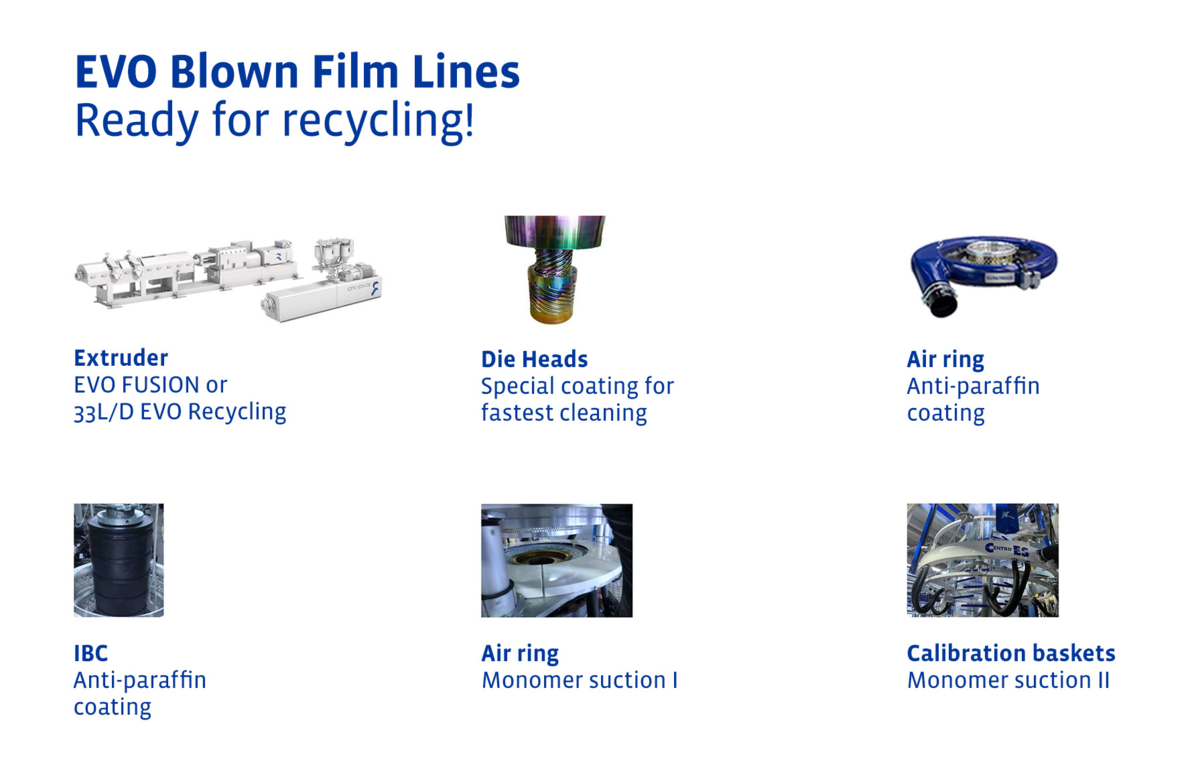
Making products from recyclate: How to lengthen cleaning intervals on your line
"Processing recyclate is always a different challenge than processing virgin material," says Christoph Lettowsky, who advises customers at Reifenhäuser Blown Film when they want to increase the recyclate content on their production lines. "Unlike virgin material, recycled material always contains impurities from its first life - quite independent of the quality of the recyclate.” These residual materials cannot be completely removed and so they form deposits in the extruder and on the die head, air ring and other line components until they eventually become visible as film defects. "In the worst case, this makes an entire roll of film unusable," stresses the expert.
Therefore, blown film producers must regularly stop their process to maintain and clean the machine equipment. "This is unavoidable," says Lettowsky, "but the question is how frequently the equipment needs to be stopped: We know from our customers' practical experience that the intervals are significantly shorter with recyclate." Since the profitability of production suffers as a result, Reifenhäuser has developed special line components for processing recyclate.

Reducing contamination
If the process involves very heavily contaminated recyclates or mixed fractions, then even special line components are no longer an adequate solution. This is because the foreign bodies they contain can make processing in the standard blown film process impossible because they result in blow instabilities, holes in the film and, as a result, the film breaks off. In this case, the expert recommends the EVO Fusion twin-screw extruder from Reifenhäuser. This blown film technology is very efficient at reducing residual components particularly effectively and makes manufacturers altogether less dependent on raw material quality. "On the other hand, adapted single-screw extruders are also capable of processing higher-grade recyclate well," adds Lettowsky. In both cases, the downstream melt filter further reduces the proportion of undesirable foreign bodies in the melt.
Wear protection reduces deposits
When processed, recyclate attacks the surfaces of components – and then deposits build up on these defects. This also applies to the extruder. The special wear protection from Reifenhäuser for barrels and screws means that the plasticizing unit withstands these stresses for longer periods and needs less frequent cleaning
Here, too, there is more to consider than for processing virgin material: "A standard screen changer is no longer enough to process recyclate because of the high percentage of impurities (foreign bodies)," explains Lettowsky. Instead, larger and finer filter surfaces are needed to filter out more particles. Since the filter requirements differ depending on the degree of contamination of the recyclate, Reifenhäuser cooperates with various screen changer manufacturers and advises customers on the best product to select.
Delaying deposit formation
Equipment runtime can also be extended by delaying deposit formation. "There are well-established coatings in the die head for virgin material," Lettowsky says. "But we find that with recyclate processing, the die heads need to be cleaned more frequently, which is extremely costly." For this reason, Reifenhäuser now uses special coatings that are even more suitable to process recyclate. The benefit: Die heads can also be retrofitted with this special protection.
Die head cleaning
Fast and professional die head cleaning is a worthwhile investment and allows producers to continue production quickly. Reifenhäuser therefore offers a complete service for cleaning production tools. Learn more about Reifenhäuser die head cleaning.
Another problem centers around paraffin deposits that form on the IBC tower after the melt exits the die and inside the line. "Eventually, larger accumulations are carried away by the film and are deposited on it," explains Lettowsky. Then the film cannot be printed or it becomes riddled with holes. Special anti-paraffin coatings on the IBC tower and on the lips of the air ring delay the formation of these deposits. This is further enhanced by special devices on the air ring and the calibrating basket to extract contaminated vapors.
"If film manufacturers combine various solutions, they can significantly extend their cleaning intervals," explains Lettowsky. „"At best, our goal is to allow our customers to return to the cleaning intervals they are used to with virgin materials." By the way, when cleaning is then due again, Reifenhäuser also supports its customers with a wide range of cleaning, maintenance, and repair services for various components.
.png)